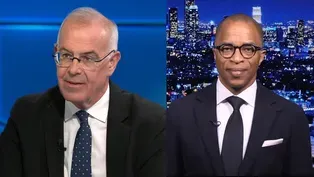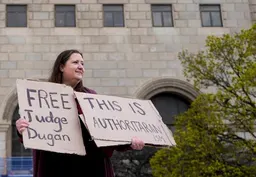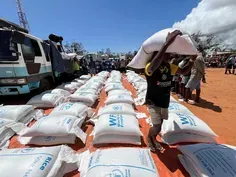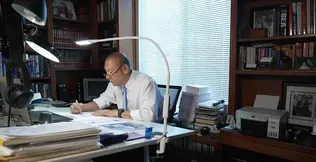
U.S. business leaders shifting plans because of tariffs
Clip: 4/25/2025 | 7m 24sVideo has Closed Captions
How U.S. business leaders are shifting plans amid tariffs and uncertainty
With tariffs in effect around the world, corporate leaders are raising concerns about the uncertainty already created. Many are now asking the White House to reconsider new tariffs that are set to come into play next month. The CEOs of Walmart and Target reportedly warned President Trump there could be empty shelves within weeks. Amna Nawaz discussed how businesses are reacting with Rich Lesser.
Problems with Closed Captions? Closed Captioning Feedback
Problems with Closed Captions? Closed Captioning Feedback
Major corporate funding for the PBS News Hour is provided by BDO, BNSF, Consumer Cellular, American Cruise Lines, and Raymond James. Funding for the PBS NewsHour Weekend is provided by...

U.S. business leaders shifting plans because of tariffs
Clip: 4/25/2025 | 7m 24sVideo has Closed Captions
With tariffs in effect around the world, corporate leaders are raising concerns about the uncertainty already created. Many are now asking the White House to reconsider new tariffs that are set to come into play next month. The CEOs of Walmart and Target reportedly warned President Trump there could be empty shelves within weeks. Amna Nawaz discussed how businesses are reacting with Rich Lesser.
Problems with Closed Captions? Closed Captioning Feedback
How to Watch PBS News Hour
PBS News Hour is available to stream on pbs.org and the free PBS App, available on iPhone, Apple TV, Android TV, Android smartphones, Amazon Fire TV, Amazon Fire Tablet, Roku, Samsung Smart TV, and Vizio.
Providing Support for PBS.org
Learn Moreabout PBS online sponsorshipAMNA NAWAZ: Both President Trump and Chinese President Xi Jinping are reportedly looking for ways to ease the trade war between the two countries.
But with tariffs in effect around the world, corporate leaders are raising serious concerns about the ongoing tension and uncertainty already created.
Many are now asking the White House to reconsider new tariffs that are set to come into play next month.
Earlier this week, the CEOs of Walmart and Target reportedly warned the president there could be empty shelves within weeks.
To get more of a sense of how businesses are reacting, I spoke earlier with Rich Lesser.
He is the global chair of Boston Consulting Group, who works with CEOs of major companies.
Rich Lesser, welcome to the "News Hour."
Thanks for being here.
RICH LESSER, Global Chair, Boston Consulting Group: It's a pleasure.
AMNA NAWAZ: So you have been meeting with and convening groups of CEOs, not just around the country, but really around the world, to talk about how they are navigating this moment.
What do they tell you behind closed doors about their concerns and how they're approaching this moment?
RICH LESSER: Yes, it's very interesting.
Of course, the start of those conversations is always about the high-level stuff, the general economic forecast, inflation, GDP, all that sort of stuff.
But then, when you get beyond that, you typically get into three different kinds of topics.
The first topic is just uncertainty.
I mean, the tariffs are a challenge, and there's been a lot written and discussed about that.
But what's even more challenging is not knowing where they're going to land.
And that makes it harder to want to invest.
You might want to invest, but it makes it harder to know how and when to invest, whether it's doing deals or adding manufacturing assets or building infrastructure.
AMNA NAWAZ: Yes.
RICH LESSER: And so the uncertainty is the first topic.
I think the second is, many people want to come to the U.S. and to build.
And that's been true even leading up to the inauguration.
I heard that quite frequently.
I think the work force issues are a real challenge.
Many of the towns that the president rightly identified as having been decimated by what's happened over the last few decades, those people have left those towns.
RICH LESSER: It's not easy to know how you're going to restart.
It's not easy to find work force.
And I have heard that from CEOs across a whole range of industries.
And then the third is any time you have this much change in such a short time, there's a risk of supply chain shocks.
And obviously this isn't COVID.
It's nothing like COVID.
But that -- we saw, when the whole world gets changed overnight, you can have supply chain issues.
So how we get from where we have been to where we're going, the risk of the bumps along the way being substantial, like, those things are what's on people's minds.
AMNA NAWAZ: Yes.
And it's a bit of sort of paralysis among those leaders in terms of decision-making because of that.
Is that right?
RICH LESSER: So, yes and no.
If you're the CEO, you have got to be ready to make decisions whatever the world is.
RICH LESSER: But there are just some decisions that it's better to wait a while on.
And I think right now, until we get a sense of where things are going to land, how these negotiations will proceed, there's a lot of them going on in parallel.
Once we know where they land, then I think CEOs are likely to feel more confident taking decisions about their investment posture, their supply chain footprint, how they want to evolve their business and what they need to do on things like pricing that they have to navigate as well.
AMNA NAWAZ: So that's where consumers are paying attention, right, things like pricing.
AMNA NAWAZ: From their perspective, when are they going to start to feel all of this and how will it show up in their everyday lives?
RICH LESSER: You have to make an assumption about where we're going to end up when you say that.
And I honestly don't know, right?
I mean, this was a more optimistic week.
We saw the stock market doing better because people are more optimistic we will get to lower tariffs and the president said some positive words on that line.
If we are where we are today... RICH LESSER: ... some of the examples are things like -- the near one will be bananas, just to take a really simple one, because all our bananas are imported.
We're not going to grow bananas here probably ever, but certainly not for many years.
Right now, there's a 10 percent tariff from a country, say, like Honduras.
And there was very little value added in the U.S., so that 10 percent tariff will probably hit about a 7.5 percent increase on the price of bananas on the shelf.
Bananas aren't so expensive, but it is a staple product for many, many families.
RICH LESSER: If I look further out, I think some of the seasonal things that will come over the course of the rest of the year, back to school, Halloween, Christmas.
In each of those, consumers buy a range of things that are made in other countries, whether it's clothing for kids and shoes and some of the school supplies, whether it's Halloween costumes, whether it's Christmas tree, artificial Christmas trees that are made overseas.
And then, if you bring it in a more personal way, even something like bridal gowns.
The good news is, brides tend to get their dresses well before the wedding.
RICH LESSER: So the weddings that are going to happen over the summer, probably most of those dresses are already in the U.S.
But if you project out to the fall and you have -- those gowns are maybe on the water right now are about to be shipped, and those could go up substantially in cost.
There's actually little stores, small, small businesses that sell bridal gowns, that are really worried about how they will stay in business as prices go up.
So, again, hopefully this will resolve.
We don't know.
RICH LESSER: But those are the kind of things that I think consumers will actually feel directly in their lives as this plays forward.
AMNA NAWAZ: You know, you mentioned that brief rally we saw in the markets.
That followed the president kind of softening his stance, at least in some of the rhetoric when it comes to the trade war with China.
And that followed a meeting with CEOs at the White House.
Does that tell you that he is listening to business leaders in these cases?
RICH LESSER: I think the president genuinely is listening and listening to a wide range of input, some of whom have very different views.
I mean, he has advisers in the White House, obviously, who are very strong advocates for tariffs.
I think most CEOs really have concerns about it, and particularly very broad-based.
And I'm really glad that he's engaging with them.
I mean, the people he met with are really some of the best CEOs in this country, and I think -- and they're also very honest.
I know all three of them, and they're quite very honest people.
And I think they will tell him in private what they really expect to happen, and that's a good thing.
AMNA NAWAZ: You have also said previously that you believe that President Trump has accurately tapped into a real problem in the country that we have ignored for too long.
But the way that he's going about addressing it now, we have a series of country-by-country deals, potential deals, going on that could go on for quite some time.
So even if you believe that we need to reshore a manufacturing job, we need to address trade imbalances, is this the best way to go about that?
RICH LESSER: We will only know looking backward.
In all honesty, I think that if we end up exactly where we are now, I think there will be a lot of second-order impacts, whether it's things like bananas or bridal gowns or things like that, that are probably not things we're going to make in the U.S. going forward and will have impact.
The group I'm the most concerned actually are small businesses.
Big businesses have a lot of capabilities, a lot of resilience, particularly since COVID, into their supply chains.
They have a lot of ability to make moves.
It will still be costly, but they will figure out a way.
I think a lot of smaller businesses would be really challenged if things end up where they are right now, and -- but hopefully that's not where we're heading.
AMNA NAWAZ: In the meantime, we track the bananas and the bridal gowns, right?
RICH LESSER: And back to school.
AMNA NAWAZ: And back to school.
Rich Lesser, global chair of Boston Consulting Group, thank you so much.
Such a pleasure.
RICH LESSER: It's a pleasure to be with you.
Brooks and Capehart on Trump's reaction to public pressure
Video has Closed Captions
Brooks and Capehart on Trump's reaction to public pressure (9m 31s)
FBI charges judge with obstructing immigration agents
Video has Closed Captions
Judge charged with obstructing immigration agents, escalating Trump's fight with judiciary (6m 54s)
News Wrap: U.S. envoy meets with Putin for talks to end war
Video has Closed Captions
News Wrap: U.S. envoy meets with Putin for talks to end Russia's war in Ukraine (4m 15s)
'People are starving,' WFP says as Israel blocks aid to Gaza
Video has Closed Captions
'Food is not political,' WFP head says as U.S. cuts aid and Israel blocks help to Gaza (7m 38s)
Political cartoonists navigate a changing media landscape
Video has Closed Captions
Political cartoonists on navigating a changing media landscape (7m 55s)
Vatican prepares for potentially polarizing papal conclave
Video has Closed Captions
Vatican readies for Francis' funeral and potentially polarizing papal conclave (6m 44s)
Providing Support for PBS.org
Learn Moreabout PBS online sponsorshipSupport for PBS provided by:
Major corporate funding for the PBS News Hour is provided by BDO, BNSF, Consumer Cellular, American Cruise Lines, and Raymond James. Funding for the PBS NewsHour Weekend is provided by...

















